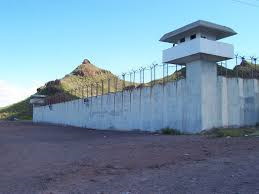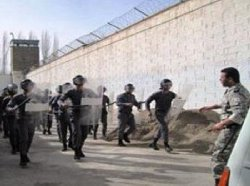
In Iran, the number of prisoners infected with coronavirus is increasing. Given that prison is a closed space, lacking proper nutrition, lacking adequate health and medical facilities and with high population density, Coronavirus infection threatens the lives of many prisoners. Despite the issuance of 2 directives by the head of the judiciary granting leave to prisoners, political prisoners are denied these directives. According to the judiciary, the legal status of these detainees is defined as “detained,” including those arrested during the November protests.
While the UN Special Rapporteur on Human Rights also calls for the release of all prisoners, the release of political prisoners is blocked by the security and judicial systems. On Sunday, March 15, 2020, a prisoner was transferred from ward 14 of Urmia Prison to a hospital outside of prison after testing positive with coronavirus. Also, according to the Human Rights Organization in Defense of Political Prisoners, two female wardens in Evin Prison have been barred from coming to work for the past seven days for suspected exposure to the coronavirus. In recent days, the test results for one of them was confirmed positive.
On March 16, 2020, 128 prisoners quarantined in wards No 1, 2, 3, and 4 of Evin Prison went on a hunger strike in protest of their exposure to dangerous coronavirus disease and the deplorable state of health and food.
However, when the prisoners realized that after 2 months of the coronavirus outbreak, they had no alternative, and their deaths were inevitable, they decided to revolt and escape from prison. According to Khorramabad local citizens on March 18, 2020, prisoners in Ward 3 of Parsylon Khorramabad Prison Mass rioted and escaped from prison. 250 prisoners tried to escape.
Some of them were brutally attacked by prison guards and killed by gunfire, but 130 of them managed to escape. During the riot at Parsylon, prisoners broke the prison’s door. They confiscated the weapons of the guards, wounded two of them and then fled. The rebellion took place in a coordinated plan from outside and inside the prison. Some of the prisoners’ friends from Koohdasht attacked the prison from outside in 2 cars, while simultaneously in a coordinated effort, prisoners from inside the prison rioted. The guards in this situation were very frightened and lost control.
Witnesses at the scene said they heard continuous gunshots from near the prison. Following the uprising of Khorramabad prisoners and their successful escape, the security authorities and the Revolutionary Guards began to establish martial law in the city of Khorramabad and arrested people. The IRGC also raided nearby villages to arrest fugitive prisoners. The people of Khorramabad opened their homes to runaway prisoners, and many people drove them out of the city in their cars so that the IRGC could not catch them.
One citizen who himself was imprisoned in this same prison said, “The prisoners escaped because they treat the prisoners here like animals. You need a large amount of bail and tens of documents to go on leave, and on top of that a few prison guards must guarantee your bail.” Last year Ramin Biranvand, a 20-year-old prisoner in ward 2 of this same prison, committed suicide because they demanded huge bail bonds, plus the guarantee of 6 prison guards. Finally, the lack of 1 last guarantor prevented him from taking leave, and he committed suicide out of anger. There was a countless number of hunger strikes. The prison social workers instead of tending to strikers’ demands, put them in a cage and left them in the cold.

According to the citizens of Aligoodarz, prisoners at the Aligoodarz Central Prison in the east of Lorestan province on March 20, 2020, rioted. This was also a coordinated effort from outside the prison. Prisoners, in order to save themselves from coronavirus, smuggled 3 handguns into the prison by their friends out of prison and forced prison guards to surrender and then tried to escape. During their escape, they clashed with guards. About 13 prisoners manage to escape and 4 prisoners were killed by the authorities.
The governor of Aligoodarz, Hamid Keshkoli, acknowledged this insurgency and said, “This evening the prisoners were trying to escape from Aligoodarz Prison and a riot broke out. The prison situation is now under control, and unfortunately, one prisoner was killed and another wounded in the leg.”
Eyewitnesses reported that agents shot the prisoners even from the rooftop. After the riot, many ambulances carried injured from prison to hospital. The IRGC blocked all roads to prison in fear of propagation of insurgency to outside and people coming in aid of prisoners.
Currently, in other prisons in Iran, conditions are explosive.


1 comment
It’s going to be end of mine day, but before ending I am reading this impressive piece of writing to increase my know-how.